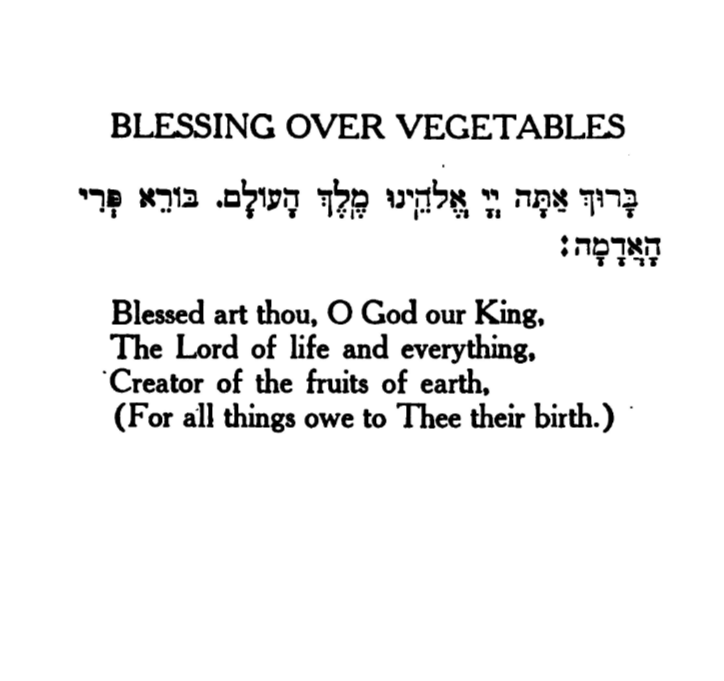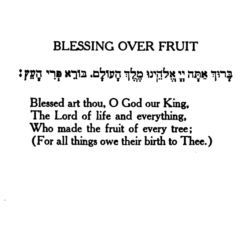| Source (Hebrew) | Translation (English) |
|---|---|
בָּרוּךְ אַתָּה יְיָ אֱלֹהֵֽינוּ מֶֽלֶךְ הָעוֹלָם בּוֹרֵא פְּרִי הָאֲדָמָה׃ |
Blessed art thou, O God our King, The Lord of life and everything. Creator of the fruits of earth, (For all things owe to Thee their birth.) |
This paraliturgical supplement to the blessing before eating vegetation, vegetables, and fruit of the earth was written by Jessie Ethel Sampter and published in her Around the Year in Rhymes for the Jewish Child (1920), p. 84.
Source(s)


“בּוֹרֵא פְּרִי הָאֲדָמָה | Blessing Over Vegetables, a rhyming translation and explanation by Jessie Ethel Sampter (1919)” is shared through the Open Siddur Project with a Creative Commons Attribution-ShareAlike 4.0 International copyleft license.
Jessie Sampter (March 22, 1883 – 1938) was a Jewish educator, poet, and Zionist pioneer. Born in New York City to Rudolph Sampter, a New York attorney, and Virginia Kohlberg Sampter, she contracted polio at thirteen which prevented her from leaving home. Unable to attend school her family hired tutors. Later she audited courses at Columbia University. In her twenties she joined the Unitarian Church and began writing poetry. Her poems and short stories emphasized her primary concerns: pacifism, Zionism, and social justice. Around this time, she began spending time in the home of Henrietta Szold and began to appreciate the Eastern European Jews of New York City. She moved into a settlement house on the Lower East Side, then to a Young Women's Hebrew Association. Assuming the role of Hadassah's leading educator, she produced manuals and textbooks and organized lectures and classes, training speakers and leaders for both Hadassah and other Zionist organizations like the Federation of American Zionists (then the Zionist Organization of America). She composed educational manuals with Alice Seligsberg and edited a textbook on Zionism. In 1919 she settled in Palestine where she helped organize the country's first Jewish Scout camp. Sampter developed a strong commitment to assisting Yemenite Jews, founding classes and clubs especially for Yemenite girls and women. She adopted a Yemenite orphan. At the time of her death she had established a vegetarian convalescent home at Kibbutz Givat Brenner.
Aharon Varady (M.A.J.Ed./JTSA Davidson) is a volunteer transcriber for the Open Siddur Project. If you find any mistakes in his transcriptions, please let him know. Shgiyot mi yavin; Ministarot naqeni שְׁגִיאוֹת מִי־יָבִין; מִנִּסְתָּרוֹת נַקֵּנִי "Who can know all one's flaws? From hidden errors, correct me" (Psalms 19:13). If you'd like to directly support his work, please consider donating via his Patreon account. (Varady also translates prayers and contributes his own original work besides serving as the primary shammes of the Open Siddur Project and its website, opensiddur.org.)
Stable Link:
https://opensiddur.org/?p=51623
Associated Image:
(This image is set to automatically show as the "featured image" in shared links on social media.)
Re-formatted:
ODT
Terms of Use:
Be a mentsch (a conscientious, considerate person) and adhere to the following guidelines:
- Properly attribute the work to Jessie Ethel Sampter and Aharon N. Varady (transcription).
- Clearly indicate the date you accessed the work and in what ways, if any, you modified it. (If you have adapted the work, let us know so that the contributor might consider endorsing your revision.)
- Provide the stable link to this resource: <https://opensiddur.org/?p=51623>.
- Indicate that the original work was shared under the Creative Commons Zero (CC 0) Universal license a Public Domain dedication. (To redistribute or remix this work in any format, modified or unmodified, you must refer to the terms of the license under which the work is shared.)
Additional Notes:
- The views expressed in this work represent the views of their creator(s) and do not necessarily represent the views of the Open Siddur Project's developers, its diverse community of volunteer contributors, or its institutional partners.
- We strongly advise against printing sacred texts and art containing divine names as these copies must be regarded with reverence, complicating their casual treatment and disposal.
- If you must dispose of a printed sacred text (one containing Divine Names), please locate the closest genizah (often established by a synagogue) and contact its custodians for further instructions. We also recommend using Morah Yehudis Fishman's Prayer for Adding a Work to the Genizah.
Support this work:
The Open Siddur Project is a volunteer-driven, non-profit, non-commercial, non-denominational, non-prescriptive, gratis & libre Open Access archive of contemplative praxes, liturgical readings, and Jewish prayer literature (historic and contemporary, familiar and obscure) composed in every era, region, and language Jews have ever prayed. Our goal is to provide a platform for sharing open-source resources, tools, and content for individuals and communities crafting their own prayerbook (siddur). Through this we hope to empower personal autonomy, preserve customs, and foster creativity in religious culture.
ויהי נעם אדני אלהינו עלינו ומעשה ידינו כוננה עלינו ומעשה ידינו כוננהו "May the pleasantness of אדֹני our elo’ah be upon us; may our handiwork be established for us — our handiwork, may it be established." –Psalms 90:17










Leave a Reply